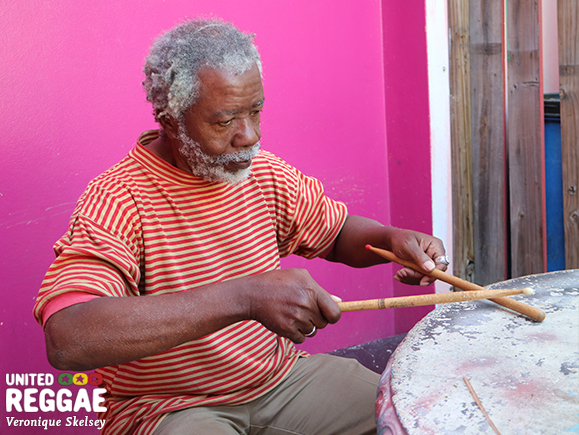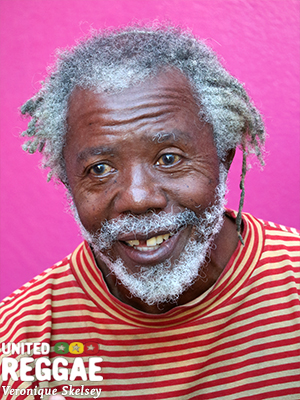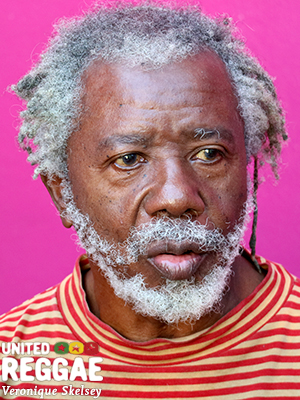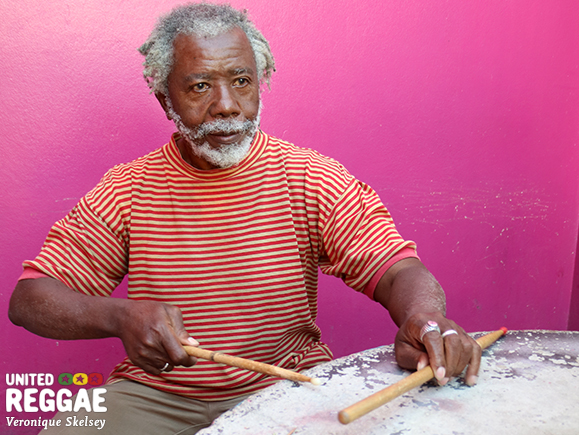Articles about reggae music, reviews, interviews, reports and more...
Interview: Mikey Boo Richards in Kingston
- Home
- Articles
- Interviews
- Interview: Mikey Boo Richards in Kingston

Interview: Mikey Boo Richards in Kingston
"I am sorry I did not learn from my father"
Sampler
If you were to call the name of Jamaica’s most high profile drummer, you might offer Sly Dunbar, Carly Barrett or Lloyd Knibb. But if a top reggae rhythmist, such as Sly himself, were to rate their peers – “Mikey Boo” Richards would figure in the list.
Mikey Boo is the son of Latin and jazz drummer Leonard Richards. He eschewed lessons from his father - only later taking up the family calling.
Mikey became a regular member of In Crowd and Now Generation bands. He did session work for Studio 1, Harry J, Joe Gibbs, and Lee Scratch Perry, on some of the greatest LPs “the Upsetter” ever produced. He toured regularly with Jimmy Cliff and Culture. This year, he returned to the international spotlight after a long absence – joining Sly in veteran ensemble project Kingston All Stars.
United Reggae met Mikey Boo at Kingston’s Mixing Lab studios to conduct this short interview. All around him musicians and studio staff were having loud animated conversations. Yet Mikey was peaceful and serene, staring off into space. Behind the cataracts on his eyes, his pupils were blue-green tinged and youthful. When asked about his health he said “It is okay. Maybe not as okay as I would want but okay.”
Mikey had a minor stroke a few years back, which affected his playing style. Whether for this reason or simply because of the countless recordings he attended, his memory for exact details required a little prompting. At one point guitarist Dalton Browne played a Pablo Moses track using his phone to remind Mikey of the multiple albums he made with the singer.
Yet the quiet, enigmatic Mikey was smiling during and after our conversation. He still had some interesting stories to tell - particularly concerning his father and the legendary musicians he called friends. Reggae fans tend to get hung up on facts and figures, but for Mikey people and feelings left the most lasting impression.
A couple of days later, bassist Boris Gardiner, Mikey’s old partner in rhythm at Scratch’s Black Ark, would fill in one of the gaps. He told United Reggae one of the Bob Marley songs he and Mikey worked on was Punky Reggae Party (although Sly recalls playing a session for it too).

Where were you born?
Kingston. Jonestown.
How did you get your nickname Mikey Boo?
It was like a joke. Jamaicans love to make nicknames and put it on you for no real reason. And the more you fight against it - it sticks on you! (Laughs)
Your father was a drummer. He taught Lloyd Knibb to play.
Yes, he was. He played Latin and jazz. I used to see in the yard him setting up his drums and teaching all those guys. But I ran away! I wasn’t interested. (Laughs)
So your dad wanted to teach you too?
Yeah. But I never really showed any interest and then eventually I started by myself, just doing things, and I didn’t know what I was doing! But he wasn’t alive at that time. It’s like I was late! But boy, the spirit of him came into me. (Laughs) I used to be around people like the guitarist Ernest Ranglin. And the keyboard player - I can’t remember his name now.
Aubrey Adams.
Yeah, yeah. My father used to tell me to hang out with those people.
And learn something…
Yeah. And then I realised. I wanted to play drums but I couldn’t! I started to do it and it started paying off. I just started to realise this you know? I used to say to myself “I am sorry I did not start and learn from my father“. I should have done that because it would’ve taken me far. Can you imagine crossing Latin with reggae? If you were doing things like those it would push you further as far as music is concerned.
 Was there music on your mother’s side? How much did sound system and listening to music on the radio play a part in your education?
Was there music on your mother’s side? How much did sound system and listening to music on the radio play a part in your education?
Not to my knowledge. I listened. From every area you can pick up things. If you’re listening keenly you will know what you want to pick up and where you can pick it up.
Which drummers from America did you admire?
Billy Cobham, yeah. Wicked jazz and Latin. Wicked in his finesse and everything. Everything was great. Karl Wright. I can’t remember their names now. But if I heard their names I can say it out to you.
How did you pick up the drums?
I just played on the veranda. There was a drum set at Aubrey Adams’ house. We used to be at Aubrey Adams house studying keyboards. He had nephews there and another person that came around to learn also. They just started talking and exploring and thinking, telling each other they were going to form a band and all of that! (Laughs)
Did you join their band?
Well the first band I didn’t form it with them, I formed it with some different people. The band was called In Crowd.
Fil Callender’s band.
Fil Callender. He was the drummer. But he wanted me to play the drums.
 I didn't know what Fil Callender saw in me
I didn't know what Fil Callender saw in me
He wanted to play the guitar and sing more?
Yeah, yeah. I was asking myself if he was serious because he was a more accomplished drummer than me! I didn’t know what he saw in me or what he heard.
So through In Crowd you got involved with Now Generation due to the crossover between the two bands and their shared musicians?
Yeah, yeah. Because we used to take musicians from both bands together to do studio work.
What was the first studio session you played?
(Pauses) The first song I was… trying to remember, oh wow! (Laughs) It was a hit you know? For Downbeat. Sir Coxsone Downbeat.
So was it through Fil being the drummer at Studio One - he brought you there?
Yeah. I went with Fil about the band. In Crowd. And then he said “Play a song” and I would play a song, you know? I did it and the song hit. This was early 70s. What was his name? Very good singer and a very good artist. Used to have a group and he was the leader. Sometimes they sang as a group and sometimes they sang on their own.
 John Holt?
John Holt?
It was John Holt.
A Love I Can Feel?
A Love I Can Feel! (Sings) “I want a love I can feel“.
That was your first song? That’s amazing.
And the next one, the second song was (pauses) what’s his name? Johnny Too Bad.
I remember it was done at Dynamics.
How much session work did you do for Coxsone? Did you stick around or move on?
Moved on. I wasn’t really the drummer at Coxsone. It was really Fil. I went there because he said I must come down. That is why really.
So after Studio One and Dynamics when did you go to Harry J?
Around about the same. I went to Harry J through Geoff.
 I played in a totally different style
I played in a totally different style
Geoffrey Chung from Now Gen? And you did Breakfast In Bed for Harry J which was a big hit.
Yeah that was a big hit. And when we did that song he didn’t want it! He didn’t want it because he said he didn’t like how the drums played. Because I was experimenting. I could hear it could work. But he was not a musician. He was more a producer. And when I say producer, it was really us who were the producers. He was shocked when he realised that it hit! And it was because of the drums! Because I played in a totally different style.
And then Harry J said you need to come back and do an album. That was the first session Clive Hunt played on.
Yeah. Could have been.
 I saw some qualities in Clive Hunt that I could deal with
I saw some qualities in Clive Hunt that I could deal with
Clive told me that you encouraged him to become a producer. He told me you gave him some money to go and record Milk And Honey.
I don’t remember. But I saw some qualities in him that I could deal with so I said “You know, why don’t you try and project that, push out that. Do what you want to do, do your own stuff. That’s the way I think you can get off and get off fast”.
Is it true that you played on the first Third World album?
Yeah, it never came out! (Laughs) I don’t know why! Geoffrey produced that.
You also played on several albums for Ernie Smith. Such as Life Is Just For Living which came out in the UK on Trojan.
Yes, Ernie Smith. I did a lot of songs with Ernie and all of them hit.
Did you do a bit of work at Randy’s as well?
Yeah. Some. Randy’s was the roots place. Roots came out of Randy’s. I used to like them. I don’t remember which songs. There was so much you know?
Do you remember working on Joe Higgs Life Of Contradiction in 1973? Or Max Romeo Revelation Time album in 1975? Probably their greatest albums.
I’m trying to remember. A lot of stuff was happening then! (Laughs)
 I did a lot of songs with Ernie Smith and all of them hit
I did a lot of songs with Ernie Smith and all of them hit
How about Ernest Ranglin’s Ranglin Roots in 1976? I guess Ernest was proud of you for following the family tradition in the end.
Yeah! (Laughs) It was okay you know? Him being such a big musician, boy, you don’t know how to explain it. Big musician. Being around him, boy your head would swell!
How did you start recording with Scratch?
Well, it was like we went there, did stuff and if he liked you, you would play. After that, Scratch came to my house every morning, religiously, to wake me to take me to his studio. (Laughs)
Some of the work you did for Scratch like the Super Ape album ended up being picked up by Island Records. You also played on Heart of the Congos. Did you see many royalties for these famous albums?
I haven’t really seen much. Because the person who owns them was maybe thinking they would see about you, then he was more seeing about himself, if you can understand? Then after that he disappeared and that was it.
 Scratch came to my house every morning, religiously
Scratch came to my house every morning, religiously
You did a bit of work with Bob Marley & The Wailers. Can you tell me about that?
(Pauses) It was a long time ago. I can’t remember it now. I remember one song (sings) “So much trouble in the world“. And some more but I can’t remember them right now.
But you knew Bob well? Later you did some solo work with Bunny Wailer.
Yeah. Because we used to live close to Trench Town. He lived on Fourth Street and I lived up in Jonestown. And it was like he was the great Bob Marley but nobody realised then! (Laughs) I was a musician coming up and all of that, it was kind of easy for us to get together.
You did three albums with Culture. And you toured with them as well.
Yeah man. They came and said they had a tour but they would like to venture on and they would like to me to come with them, and I wanted the experience so I went. And it was okay.
And again with Virgin Records did you see adequate royalties for the work you did?
Not as much! (Laughs)
You played on I Kong’s The Way It Is album in 1977. Those sessions were legendary.
Yeah. There was a space where you can learn, you know? That was a good thing.

I noticed you played on a few albums released on English labels in the late 70s and early 80s. Prince Lincoln’s Natural Wild, The Overnight Players’ Babylon Destruction and Desi Roots’ Doing It Right. Did you spend any time in England or were they just released via English labels?
Not much to speak about. But I did spend time in London, England. Like doing things with other people when you’re playing in a band and you pass through.
In the 80s you recorded a few albums and toured with Jimmy Cliff.
Yeah, but I can’t remember now the way I would want to. Because Jimmy Cliff was a good person. When he had his space, his company, you could learn.
What happened in the late 1980s when the drums went digital? You still kept working?
Yeah man. People used to come to me because of the sound of the drums and how I would try to make it go through. They didn’t even bother to think about the new newness. I never really, really liked it. So I would try to use the acoustics and make everybody comfortable. I would say I was not encouraged [by digital] (Laughs) Because of the sounds of it and stuff.
You did some work with Kingston All-Stars here at Mixing Lab last year? Now you’re doing an instrumental album for Fruits Records. You’re still getting session work? Is drumming your full-time income?
Yeah. I would say so. And collecting royalties a lot of the time. It comes in different areas, it comes from in one spot and then they send it to you.
 Jimmy Cliff was a good person
Jimmy Cliff was a good person
Which works that you played on are you most proud of?
Alright… We did some music in England with Herbie Mann, yes. Because I always wanted to meet people like these. And then here I am in London now working with him! Like it would swell up your head do you know? (Laughs)
[Dalton plays Pablo Moses on his phone]
Yeah! I did a whole heap of Pablo Moses too. Geoffrey Chung production.
There were certain people like Geoffrey, Fil, Jimmy, Culture, Pablo where you did more than one project. What kept you working with them?
Well, the love for it. (Laughs) Because there was never any time when I played and I didn’t feel it. Vibes were good from them.
Comments actually desactivated due to too much spams
Browse by categories
Recommended Articles
Latest articles
Recently addedView all
© 2007-2026 United Reggae. All Rights Reserved. Reproduction in whole or in part is prohibited. Read about copyright
Terms of use | About us | Contact us | Authors | Newsletter | A-Z














